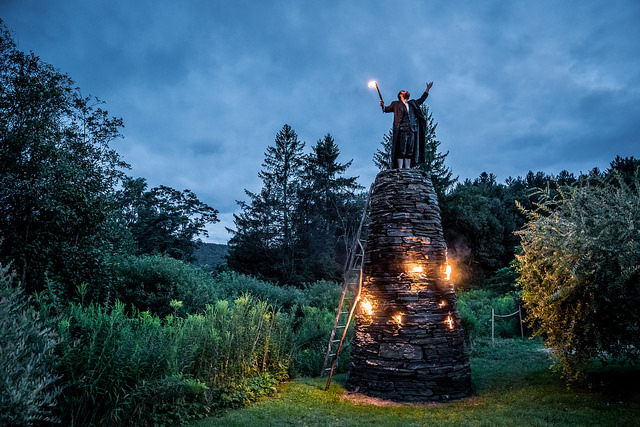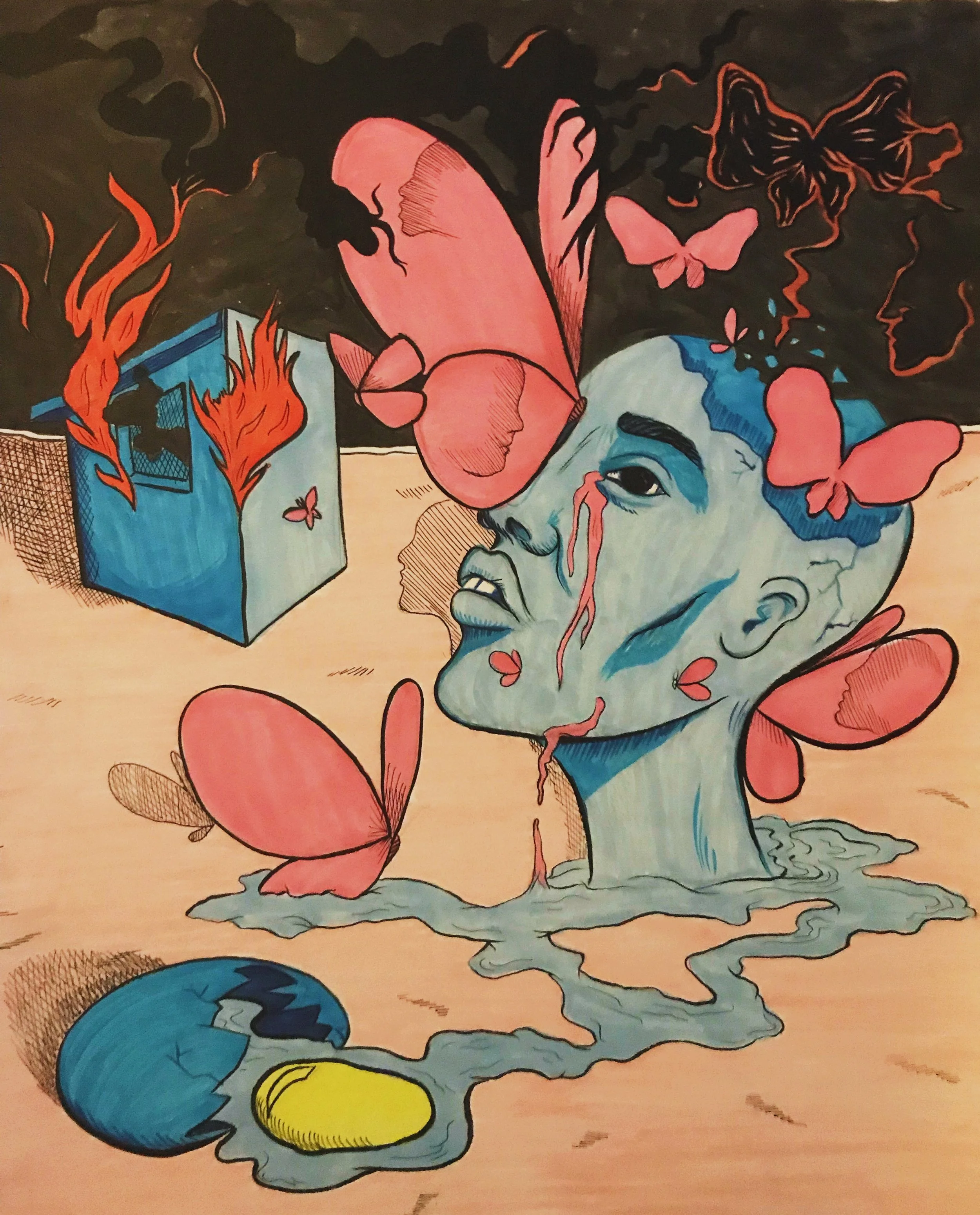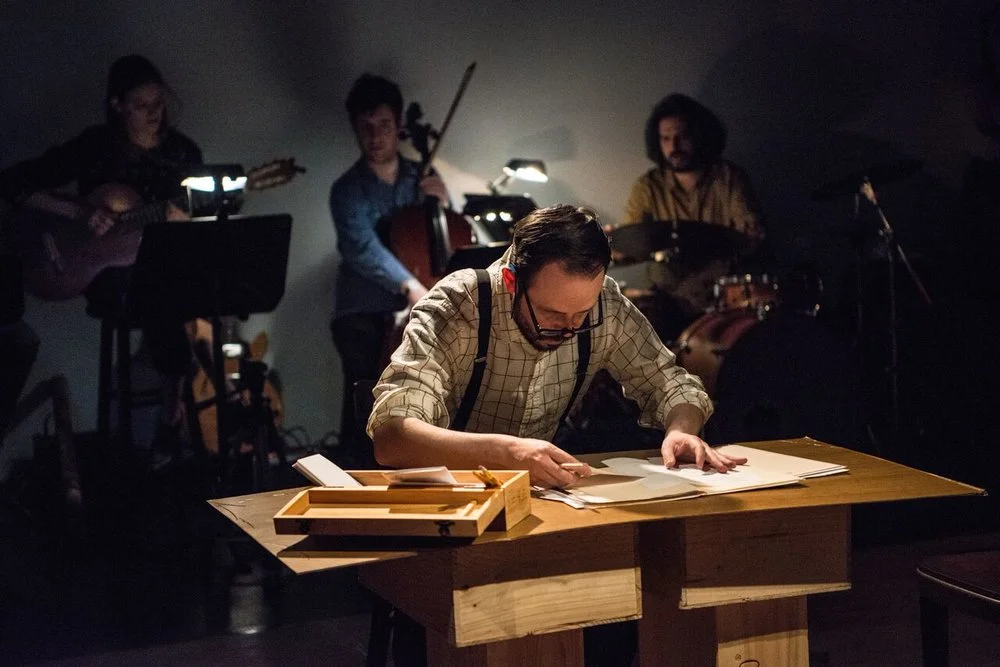We The People
Behind the barn, musicians in 18th century garments sing to the open sky. Colorful acrobats fly through the air as the sun sets. Actors lead the audience on foot through fields and streams, weaving a tale as night birds call and fireflies glow. It's a familiar scene here in western Massachusetts.
For the performers of Double Edge Theatre, a gorgeous 100-acre farm serves as the set for their annual Summer Spectacle. This year's show, We The People, knits together the many stories of the residents of Ashfield, MA at the birth of our nation into a rich tapestry of history and symbolism. Co-founder Carlos Uriona tells me, "This is the 17th year of the Summer Spectacle and the last three years were devoted to a research that we started about the history of our town, the people of our town… So we are basing the whole spectacle in retelling these stories with the magic of the land."
I first met Carlos in 2012 at a spring training intensive at Double Edge. My first impression was of a man alive with creativity and joy, fully present even in mundane moments. Carlos would spontaneously break into song while we were preparing lunch, and he always had a story at hand. He made us smile and laugh and he brought a warmth to our task, a sense of belonging and connection.
Carlos Uriona performs in “We The People”
For 22 years, Carlos has been soaking up the stories and history of Ashfield and the surrounding areas. I can hear the energy in his voice, his enthusiasm when I ask him about his connection to the town: "You know, I don't think that artists, even the most abstract people, are completely detached from the place they live, or their families. I think that we are all immersed in the land where we live and the community where we live, and that somehow we are a response."
The roots of Carlos's creative philosophy trace back through his journey as an artist. Early in his career, Carlos performed with Diablomundo, a politically tenacious puppet theatre company in Buenos Aires. Diablomundo won wide critical acclaim at home and abroad, but eventually he decided to pursue his vision in the United States. When I ask him about his experience of immigrating, he says, "I was 40 years old and I knew what I wanted to explore in terms of performance, I wanted to develop further what I started in Argentina… I came to the US and I couldn't really find anybody that would really undertake this work."
He pauses for a moment, remembering. "And then, in '96, I met Stacy [Klein, co-founder and artistic director of Double Edge and his spouse]. There was no abundance of what I wanted to do in the US, but I managed to figure out how to do it here in Ashfield. There was an opportunity, I grabbed it, Stacy grabbed it… We combined that deep research of actors with what some people would call 'site-specific', or somehow 'site-interdependent' [work]."
Carlos moved with Double Edge from a church basement Boston to a farm in the hills in the 90s. The goal then was to establish a training facility and a live/work space for creating vivid theatre. Years of work restoring buildings, tilling the soil, and meeting the community created a unique symbiosis of art and place. "I do think that Ashfield has been influencing us over and over. The more we stay here, the more we become a part of that… it's really an ecology, right? An ecosystem."
Adam James Bright in “We The People”
I ask how Double Edge fits into the ecosystem of Ashfield, and he eagerly details the myriad activities undertaken by company members. "Our people are working on different farms," he explains, "we have three or four of our actors haying after the summer spectacle. Then before the season, we do some work on their orchards, we have other people babysitting… we have a lot of interactions that are very concrete and related to what we do."
Alongside this flurry of external activity, Double Edge has developed a strong internal ecology as well. Carlos draws my attention to the shared language that has grown among these artists. "By sharing what we're doing, we are developing a language, so imagine, people you spent 18 or 24 years with… there's a ton of semiotics involved in our communication, and it's not just verbal, right? There is a language about how we use spaces, how we inhabit each room, how we knock at the door… We learn, not without difficulty, how to be mindful about each other's lives and help each other's lives."
And then, Carlos tells me about the skunk.
"I have a skunk that decided to live in the front porch of my house, so there's this dialogue now with the skunk. I need to get into my house through the back porch [laughter]." I ask, "Shared language with a skunk?", and he replies, "Yes, I think it's a language. I think we've developed a- I don't bother the skunk, so it doesn't spray. And the skunk respects my other entrance and we've established a whole thing."
He laughs warmly. It strikes me that his philosophy has been deeply woven into the fabric of his life Double Edge Theatre.
Carlos Uriona performs in “We The People”
The performances reflect this. We the People explores ideas of identity, of creating community in a new place, of immigrating to a young America and finding a sense of belonging, with the environment of the farm serving as the living, breathing foundation. It's really an ecology, right?
At the end of our conversation, I ask Carlos if he could offer a piece of advice to a young immigrant theatre artist seeking their own community in America today. Immediately he responds, "Don't give up, stay in the game, no matter what."
"It's about staying. A lot of times the first manifestations of things are not the way we envision. They only make themselves apparent in the long run, in unexpected ways. If you don't prepare yourself for this and somehow open up, then you're always trying to control the outcome. Art is not about trying to control the outcome."
"It's a slow process, but at the same time it is very rewarding. So I think one needs to stay and keep trying," he laughs again, "if that could be advice."










